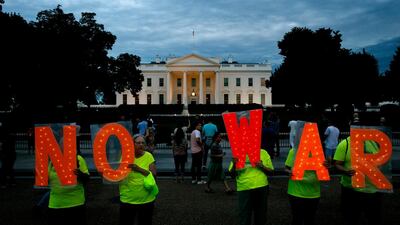Iran and the US are daggers drawn in the Strait of Hormuz but the confrontation does not have to inexorably lead to all out conflict. The past provides many situations where the tension was suddenly broken and calm restored.
On a hot June day in 1999, a column of Russian armoured vehicles advanced on Kosovo’s Pristina airport.
Peacekeeping forces had just arrived in the city as part of a ceasefire between the Serbian and the Kosovar side. Despite the hard-won agreement, the arrival of the convoy provoked fears the Russians wanted to seize their own zone of influence, a development that could have led to the division of the territory.
Feeling the heat in more ways than one was the British General Mike Jackson who defied orders from the Nato Supreme Commander Wesley Clarke to blockade the runway to ensure the Kremlin could not fly its forces directly into the peacekeeping zone.
Gen Jackson took the view that Russians were not intent on seizing the airfield but that a reckless move could unnecessarily provoke a confrontation. "Sir, I'm not going to start World War Three for you," the craggy-faced British veteran recalled telling the belligerent Gen Clarke.
Eventually the Russian vehicles moved position and the stand-off was over.
The Kosovo showdown was perhaps one of the last direct legacies of the Cold War. Over five decades the US and Soviet superpowers embedded Red Alerts in their relationship.
The Cuban Missile Crisis was one of the most grave. President John F Kennedy was still smarting from a failed CIA-sponsored invasion of the Communist-run island at the Bay of Pigs in 1961 when Moscow once again tested his resolve.
Intelligence reports indicated in October 1962 that Soviet ships were carrying missiles for installation on the island. President Kennedy imposed a naval quarantine on Cuba to prevent further Soviet deliveries. After six days of tense manoeuvring at sea, Nikita Khrushcev, the Kremlin leader, ordered the vessels to turn back. In return Mr Kennedy promised not to invade the island.
A relieved JFK returned to the White House private quarters and confided that presidency had passed a high point. He had won a test of nerves.
There were other crises during the Cold War. Twice the alerts for nuclear readiness were triggered, the first in 1979 when North American Aerospace Defense Command (Norad) suffered a computer glitch that led US officials to believe the Soviets were attacking and then in 1982 when Soviet systems mistakenly showed five incoming US intercontinental ballistic missiles.
Earlier this year two other nuclear powers appeared ready to escalate confrontation as India and Pakistan conducted cross-border strikes following an attack on an Indian paramilitary convoy. As fighter jets crossed territorial boundaries, two decades of strategic constraint seemed to have been suddenly discarded.
Phones calls from friendly countries to national security advisers on each side drew the sting from the situation. Cooler heads prevailed.
Not all turning points provide a clean break from continued hostility. The Middle East is still grappling with the consequences of the dramatic step back from the brink taken by Barack Obama in 2013. The US president's decision to cancel strikes after a regime sarin gas attack on a Damascus suburb came a year after he clearly stated chemical weapons attacks would provoke US action.
Mr Obama performed his U-turn after the British House of Commons rejected a proposal for UK involvement in the operation. The decision is seen by many analysts as a turning point in the conflict. The regime has since steadily consolidated its position and withstood two limited strikes ordered by President Donald Trump following confirmed chemical weapons incidents.


